Peter MALONE
Femme plus assassinee du monde, La/ The Most Assassinated Woman in the World
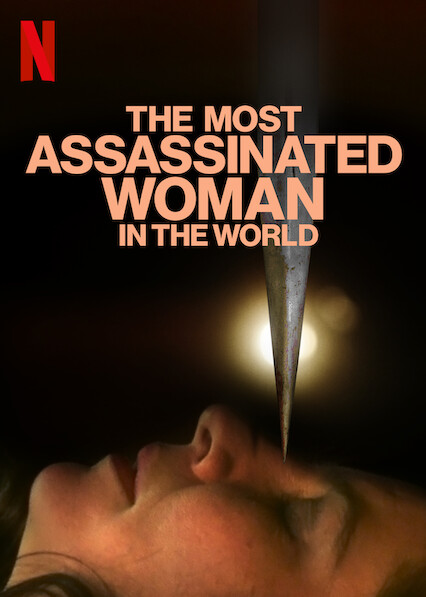
THE MOST ASSASSINATED WOMAN IN THE WORLD/ LA FEMME LA PLUS ASSASSINEE DU MONDE.
France, 2018, 102 minutes, Colour.
Anna Mouglalis, Neils Schneider, Jean-Michel Balthazar, Michelle Fau, Andre Wilms.
Directed by Franck Ribiere..
Certainly an arresting title!
And, it is soon explained, voice-over focusing on the theatre actress, Paula Maxa (1898-1970) who had made four silent films, horror films, in 1915-1916. However, she was celebrated as an actress in the Grand Guignol theatre, and a very long listing of the many ways in which she had been killed and died on stage.
The setting for this film is 1932, the time of popularity of the Grand Guignol but also demonstrations for its closure, protesters blaming a spate of violent serial killings on the influence of the performances at the theatre.
The focus of the story is on Paula, Anna Mouglalis, her domination by the manager of the theatre, not wanting to let her out of her contract, and his inventing ever more gruesome stories, no scruple, no moral in what he wants to present to make his theatre famous. And, the film shows the crowds coming to the theatre, an affluent audience, reacting in fear and horror, yet jumping to their feet to applaud at the end. The film shows one gruesome scenario to illustrate the style of performance at the theatre. And, another performance brings the story to a climax.
Paula is tormented by memories, seen in flashback, also the subject of the final theatrical piece, she and her sister attacked by an seeming friend, the sister killed, the attacker allegedly committing suicide.
Also in the film is an interesting character, Paul, the man behind-the-scenes who prepares all the special effects – and revealed that he has done a deal with the serial killer, receiving the bodies, draining their blood, experimenting for more effective concoctions for the performances.
The other main character is the journalist, Jean, Neils Schneider, who is investigating the theatre, the link with the actual murders in Paris, getting to know Paula, attracted, protective, writing his story, but also with a back story about a duel and the pursuit by the jealous husband.
The audience sees who the killer is and how he operates, his identity indicated, perhaps without the audience quite noticing, revealed at the beginning.
The film is very strong on atmosphere, especially of the theatre – and the raising of moral issues about violence, depictions of violence, influence, moral responsibility.
- The title and expectations?
- The traditional French theatre, Grand Guignol? Paris, the traditions, horror, live action, cruel plots, blood, the eager audience?
- 1932, Paris, costumes and decor, cars, theatre, cinema? The world of actors, behind-the-scenes, the affluent audiences and their response?
- Issues of horror, the actual murders, the opening, the murderous stalking the woman, fear, the sudden violence? Paula and flashbacks, her sister, the story of their parents, hoping to act, leaving, Jean, the seaside, the rapes, his alleged suicide? Serial killer, in 1932, outside the theatre, talking with Jean, his name, his deal with Paul, supplying the bodies, the flowers and the notes to Paula, the buildup to the climax, his seduction of Violette, her body, Paul and the final performance, actual blood, the audience reaction, Paula’s death? Jean, the aftermath, pursuing the young woman in the street, killing her?
- Issues of real-life serial killers and violence? Public sensitivities? The performances of the stories at the grand renewal? Violence, blame, responsibility?
- Andre, manager of the theatre, his ambitions, lack of scruple, driving Paula, owning her, refusal to let her go? As liaison with the doctor author? The doctor’s concern about Paula and her mental health, Andre driving her, his present at the theatre at the end and his concern?
- Paul, his skills, behind-the-scenes, his laboratory, the bodies, supplied by Jean, excising the blood, experiments, sugar, blends, tasting? As used in the performances? The comments by the performers about taste? And the blood on the audience, their bibs for the blood? The revelation of his dealings with the killer, the deal with Jean, the death sequence, Paul and switching the bodies, giving himself up, the tickets to America, ushering Paula into the car?
- The members of the cast, their performances, their attitudes, backstage?
- The performance, Paula, the preparations, her dressing room, on stage, the threats, eerie atmosphere, the blood, the aftermath, Paul removing the blood? And nightmares and their detail, the memories of the scene at the beach, her feeling of responsibility for her sister’s death? The re-enactment of the scene as the finale, characters, the sinister Jean, the killing?
- Jean, journalist, his interest, at the theatre, talking to Jean, watching the performance, the audience, preparing his article, discussions with his editor, the link with the serial killings? Going to the club, the singer, his memories of being there with his lover? The story of the duel, the wound, his being pursued by the masked men with the gun, his flight on the steps and bridge? His rival capturing him at the end? His relationship with Paul, the discussions are the night? His wanting to protect her? His appearing to her at the end?
- Dean and his praise of the cinema, inviting Paula, the going to see Dr No, the fan snipping Paula’s hair, the colour version?
- Jean completing his article, linking the murders and the performances, the publication of the article, his coming to the theatre, his being ousted, Paul waiting for him?
- The ending, Paul and his actions, Jean and his appearance, Paula sitting at the grave, Violette buried there, and her leaving?
- Actual events and characters, this imagination for 1932?
Ave Maryam
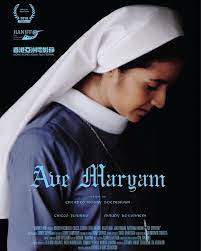
AVE MARYAM
Indonesia, 2018, 85 minutes (Netflix 74 minutes), colour.
Maudy Koesnaedi, Chicco Jerikho, Tutie Kirana, Joko Anwar.
Directed by Razka Robby Ertanto.
World audiences do not see many films from Indonesia. Some of the action shows do get release. However, this film of 2018 was released directly to Netflix and so available worldwide.
This is a very Catholic-themed film. And this is significant in Indonesia as one of the world’s largest Muslim populations. The film is an assertion that there are other religious beliefs in the country – and, interestingly, the actress Maud Koesnaedi who plays Sister Maryam so convincingly, is herself Muslim.
The setting is 1980, a time when Hollywood was making a number of films about priests falling in love, relationships with nuns, nuns leaving the convent (Broken Vows, The Thorn Birds). To that extent, it parallels these films.
A great deal of attention has been given to the Catholic setting, scenes in the church, scenes of the sisters at mass, their prayer, the relationship with the priest who is chaplain, the young priest with his more “modern” styles, the choir, clerical dress, ordinary dress, familiarity with people. The screenplay gives a great deal of attention to the life of the nuns, the more adapted religious habit of 1980, community life, prayer, the meals, kitchen, work in the laundry, sewing, and the care for the elderly sisters. The film offers a good impression of convent life. Choir sings familiar Christmas songs as well as the him, How Great Thou Art.)
The focus is on Sister Maryam, who celebrates her 40th birthday during the film. Which means that she has been several decades in the convent, devoted, taking her place in the convent duties, but especially a concern for an elderly sister who needs washing, reminders of her medication, who has lapses of memory but is also very observant and shrewd.
When the young priest arrives, especially to conduct the choir for a Christmas performance, he seems like something of a breath of fresh new air. And is comfortable moving around the convent. And, especially, since he comes from this town, he pays special attention to the elderly sister.
From the point of view of the wider audience and, perhaps, the filmmakers, this is a story about a priest and a nun falling in love, their behaviour, the consequences for each of them, especially of the sister because of the title of the film, her life, her not realising some dissatisfactions, the gradual attraction to the priest, his insinuating himself, their meetings, his invitation to go out, her changing into ordinary dress, the meetings, the restaurant, the effect?
The Netflix version is 12 minutes shorter than the original version and it is easy to see where the cut took place, at the beach, the nun beginning to unbutton her dress, not an edit but an abrupt cut, leading to the imagination about what might have happened on the beach. The cut then makes a transition to the aftermath, driving home, the priest offering her a cake for her birthday, and then her late arrival, the sisters all gathering with their cake, singing, a greeting and kissing, her breaking down.
The elderly sister has observed what is going on and makes comments about conscience and commitment.
The sisters are very supportive of Sister Maryam, especially the superior who speaks to her calmly about love, the heart, vocation. There is a sadness when Maryam packs, leaves, goes to the railway station, is in the train, sees the priest on the platform, exits the train only to find he is not there.
The key sequence is her going to the church, to the confessional, not knowing that the priest is actually hearing the confessions. She makes a full confession, blaming herself, sad. The audience sees the priest also weeping as he gives her some kind of absolution.
Where is the Sister to go? Her life? What will happen to the priest?
For many Catholic audiences, the confessional sequence will be a challenge. Given the insights into clerical abuse in more recent decades, exercise of power and control, sexual domination, the behaviour of the priest here could be considered as grooming, his gradual attentions to the sister, preparing her for the seduction. The screenplay offers no blame for him for this grooming. Which means then that his weeping and the confessional seems false, not exactly a repentance but the breaking of the relationship, certainly a sadness, but his behaviour has been selfish and self-centred.
Audiences may be familiar with these themes from English-language films so it is interesting to make comparisons through an Indonesian story.
Jump, Darling
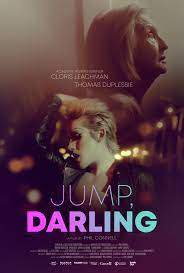
JUMP, DARLING
Canada, 2020, 90 minutes, Colour.
Cloris Leachman, Thomas Duplessie, Andrew Bushell, Sheldon McIntosh.
Directed by Phil Connell.
Jump, Darling is a brief Canadian film. It is notable as the last film for veteran Oscar-winning actress (The Last Picture Show), Cloris Leachman, in her early 90s.
She plays Margaret, the elderly grandmother, living alone, not wanting her daughter to put her in a home. But the main character in this story is Russell, played by Thomas Duplessie, having trained to be an actor, but finding that he is very much at home performing as a drag Queen. And, at the opening of the film, he is breaking up with his longtime boyfriend who has found someone else.
The main part of the story is his returning home to his grandmother, his relationship with her, caring for her, also taking money from her, cheques,, doing the shopping for her, cooking. He is emotionally upset because of the separation from his boyfriend. Relationship with his mother, her arriving each month trying to persuade her mother to go to the home, their visiting the home in an upsetting episode.
He visits the local clubs, does some singing, encounters the manager of the city club where he worked and walked out, has a dilemma about leaving his grandmother or not, returning to the city, and demanding to perform.
And the film leaves Margaret, alone, quietly remembering the past, hoping for death.
- The title? Expectations?
- The Canadian setting, the city, clubs, apartments? The range of countryside? The home and interiors? The local clubs? The musical score?
- Russell’s story, age, background, orientation, relationship with his father and memories, relationship with his mother, training as an actor, hopes for a career, drag Queen, skill, performance, satisfaction, in the city, walking out, returning home, the breakup with Justin, with his grandmother, her age, health, staying with her, helping her, but taking her money? Is mother’s visit? His dilemmas, performances in the town, reactions, from friends? Meeting the manager of the bar in the city, the return, his demands, preparation, performance? His future?
- The portrait of Margaret, Cloris Leachman in her 90s, her story, background of her husband, tensions with her daughter, her daughter’s visit, her not wanting to go into care? Her bond with Russell? Welcome him, the time with him, his care for her, her response, her attitudes towards his taking the money? Her daughter’s visits, clashes, the visit to a home? Her not wanting to go? Russell and his departure, the finale, her health, her memories, wishing to die?
- Russell’s mother, the tension in the relationship, memories of the past, her concern about her mother, wanted her to go into care? The visit to Justin to talk about the relationship?
- The clubs, the drag Queens, the range of performances, the star with the beard, in the cities, local? The gay clubs, the patrons, men and women? The performances?
- A sympathetic picture of men like Russell?
Godless: the Eastfield Exorcism
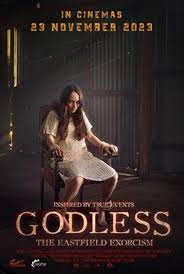
GODLESS: THE EAST FIELD EXORCISM
Australia, 2023, 91 minutes, Colour.
Georgia Eyers, Dan Ewing, Tim Pocock, Rosie Traynor, John Wood, Eliza Matengu.
Directed by Nick Kozakis.
This is an interesting, small-budget exorcism film. Filmed in Victoria, Daylesford and Hepburn’s Springs, it is based on an actual story that took place in western Victoria, Antwerp, north of Dimboola, in 1993.
After seeing and the film, it is well worthwhile googling the true story to find how accurate, in so many ways, this fictional version is.
Exorcism became very popular in cinema with 1973’s The Exorcist, then its sequels, its prequel is, and the many imitations, some very serious, some parodies. There have been Catholic exorcism films, Protestant exorcism films, Evangelical exorcism films.
The setting for this film is an Evangelical country community, led by an enthusiastic woman, Barbara (Rosie Traynor), some opening scenes of vigorous prayer and enthusiasm. One of the congregation is Ron, Dan Ewing, a farmer, more recently married, concerned about his wife, Lara (Georgia Eyers). They are seeing a therapist, Lara anxious, then rather sceptical – and there are a number of sequences with discussions against medication, vaccines, anti-fluoride, scepticism of science and medication.
Lara begins to manifest strange behaviour, dancing motions, naked, but also with some hallucinatory experiences, memories of the past, and some diabolical manifestations. Barbara recommends Daniel King (Tim Pocock), an Evangelical exorcist, not beholden to the Vatican or other authorities.
Ron is wary but accedes to an exorcism. Daniel is rather smug, self-centred, equating himself with God in his power to cast out Demons. The exorcism scenes are vivid, Daniel physically brutal and assaulting Lara, psychological bullying, God-focused demands that the Demons come out of her. Many of the local church are invited to be present and to pray.
Later in the film, there are flashbacks to explain Lara’s condition, an accident, did child and husband.
Ultimately, Daniel is so violent that Lara dies. And he then switches the experience into a hoped-for resurrection, that she will rise from the dead. The local police (John Wood from Blue Healers) comes to the scene along with the therapist. When Lara does not rise again, Daniel’s interpretation is that it is better for her to be alive with God rather than suffering on earth.
Final information concerns the rest of the principals, their trials, suspended sentences – which correspond with what happened to the protagonists in the experiences of 1993.
- Based on a true story, episodes in western Victoria, 1993?
- The popularity of the exorcist in films since the 1970s? Catholic variations? Protestant and Evangelical variations?
- The title, the implication about the evangelical believers, faith, self-appointed exorcist’s?
- The setting, the town, the farm, the citizens, the police, the small church, the congregation? The musical score?
- Lara and Ron, their marriage, the visit to Dr Walsh, the therapy, the discussions, Lara and her response, her imagination? Ron, wary, sceptical of medicine? The return visit, Dr Walsh’s diagnosis of schizophrenia?
- The religious community, Evangelical, Barbara as leader, prayer and enthusiasm, singing, copies of the Bible? Ron and his place? His concern about Lara, the discussions with Barbara, her wanting to help, her faith? Her belief in Dan, his reputation?
- The community and their wariness of science, injections, drugs, fluorides poisoning?
- Lara, the implications of mental illness, schizophrenia? But the film showing her having images, satanic creatures? Going to Dr Walsh, her belief in her? Not wanting the exorcism, her being confined, Ron and his attitude, her being bound, trying to escape, in the barn, Dan’s arrival, taking over?
- The dramatising of the exorcism? Dan, seeing himself as God’s instrument, seeing himself almost as God? His behaviour, the religious language, echoes of exorcisms, compelling the Demons to? His brutality, violence towards Lara? Verbal abuse? His diagnosis, demands of the Demons to leave? Extending the ceremonies, inviting the group in, their Bibles, their prayer, the range of characters and their beliefs? The impact on Lara? Ron, his beliefs, his doubts, concern for Lara?
- The sympathetic member of the community, being told off by Dan, her going to see Lara, getting Dr Walsh’s card, phoning her? Lara, the broken Charlotte, getting loose, in the woods, the pursuit, her demonic experiences?
- The buildup to the end, the flashbacks, her marriage, devoted husband, the baby, the joy, driving, the destruction, the crash, her being rescued, helpless, the baby dying, her husband burnt? The mould of the footprint, then smashing it? Her able to use it to break free?
- The buildup to the final violence, Dan in his intensity, the aftermath, the blood, Lara dead? The reaction of the group? Ron and his grief? Dan and his reaction, twisting the situation, predicting that Lara would rise from the dead in three days?
- The day of the resurrection, the police chief, pass relationship with the group, driving Dr Walsh, Dr Walsh’s reaction to Lara’s death, trying to talk with Ron, with Dan?
- The failure of the resurrection, Dan and his twist that Lara in heaven was better than Lara suffering on Earth?
- The after information, the arrests, the trials, the suspended sentences? (Which happened actually in 1993.)
- Audiences, belief in devil possession, exorcisms, or not? Issues of faith, rituals, interpretation of the Scriptures? Exorcist, officially appointed, self-proclaimed?
Just a Farmer
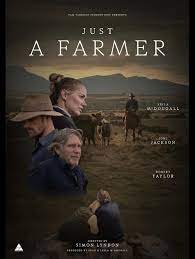
JUST A FARMER
Australia, 2023, 104 minutes, Colour.
Leila McDougall, Susan Prior, Joel Jackson, Robert Taylor, Oliver Overton, Vivian McDougall, Damian Walshe-Howlin, Trevor Jamieson, Louise Siversen.
Directed by Simon Lyndon.
There is something sad in hearing the dismissive phrase about someone, “Just a…”. This is a small but effective Australian film focusing on rural life and issues of mental health. In fact, at the beginning and end of the film, there is the urging for anyone anxious to contact Lifeline or Beyond Blue.
The power behind the film is Leila McDougall, a teacher, a farmer’s wife, with her husband establishing Rule Live in 2014, concerned about mental health and farmers, with the alarming statistic of the number of farmers who do commit suicide each year, interviewing many people and deciding to write the screenplay. She plays the central character, Alison, and much of the filming was done at the family property in Tatyoon, Victoria (including the sequence in the actual local Uniting Church), and many of the locals acting in the film, and local farm equipment used throughout.
Joel Jackson plays Alec, farmer, initial signs of some depression, working with his alcoholic father, Owen, veteran actor Robert Taylor, memories of his growing up, care for his wife, 12-year-old son and little daughter. Soon into the action film, he kills himself.
The screenplay takes up the themes of stoic continuing with life almost as if the tragedy had not happened, Alison persevering with the tasks around the farm. The children are sad, somewhat withdrawn, the boy lashing out during a local football match. Owen continues his drinking at the pub, sad memories of his dead wife in the past, suffering a stroke.
Another theme, as you would expect and hope, is that of how whoever is suffering can unburden themselves, talk to someone, talk to someone who is empathetic, Alison relying on her sister who has come to help, finding a listening ear in the woman who runs the local pub. And, the importance of the mother talking with her children, listening to her children, enabling them to express their sorrow and puzzle.
This is a topical film, made with insight and compassion, a contribution to awareness of Australian mental health.
- The title, the tone, merely a farmer?
- The initial warnings concerning Lifeline and Beyond Blue? Repeated at the end? The concern about mental health, farmers, suicides, consequences for families?
- The setting, the farm, the actual farm and farmhands performing, the actual machinery? The vistas of the countryside, the cattle, the sheep, the shearing? Fences, rescuing sheep? The sheepdogs? Barns, equipment, need for repairs? Authentic atmosphere? Musical score?
- The opening comment by the son, with his parents, the happiest days of his life, parents on horses, the roundup of the cattle, the boy and his sister driving, playing together?
- The portrait of the family, Alec, working hard, the property, his father and drinking, bringing him home from the pub, their talks, Alec less sociable, his worries, his desk, taking medication? The buildup, sympathy, 20 minutes in and his hanging himself?
- Alison, love for her husband, the children, domestic scenes, talking with her sister, her father-in-law and his help on the farm, drinking? The search for her husband, finding him dead? The impact, stoic, keeping to herself, not talking with the children, continuing on with the work, daily life, with the farmhands, the discussion about repairs to the machinery, the neighbour, Oliver, borrowing his harvester? The sister’s arrival, the house in disarray, her cleaning it, cooking? The meals?
- The screenplay not immediately giving indications of Alex’s motives, the desk, the documents, his medication? His moods? The gossip at the football match, the sister confronting the women, Alice and confronting them? The sister asking Oliver, no affair?
- Owen, father to Alec, grandfather, hard work on the farm, his physical state, the pub, yarns and swearing, friends, Jackie managing the pub? Bringing him home, continually drinking the cans, concern about his heart? Quietly sitting, the image of his wife on the tree? The story of her heart attack? The later revelation of the truth, suicidal, the crash, the baby in the car? Owen and his stroke, hospital, Alison devoted to him? The return home, with the grandchildren, giving up the drink?
- Children, the young girl, drawing, playing, devotion? The boy, 12 years old, school, football, the fight and bullying during the match, morose, love for his father, no talking about his death, hard work on the farm?
- Alison, bonding with her sister, able to talk, the sister’s encouragement?
- Alison going to talk to Jackie, able to unburden herself, the puzzle of not talking, the importance of talking with someone sympathetic, therapy? Farmers and wary of therapy, the reference to “shrinks” by Owen? Alison facing up to it? Talking with her children, inviting them to talk about their experience, hurt, guilt?
- Realistic portrait of life on a farm, the actual farm, the local Uniting Church, the minister and his words? Stock, crops and hay, harvesting, weather, machinery, finance?
- In the final poetic words and reflection?
One Perfect Match
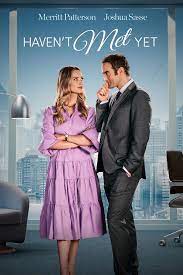
ONE PERFECT MATCH
Australia, 2023, 87 minutes, Colour.
Merritt Patterson, Joshua Sasse, Lynn Gilmartin, Meg Fraser, Callan Colley, Charlotte Chimes, Claire Weller Price, Mitchell Bourke.
Directed by Jo-Anne Brechin.
A Date Movie. Literally. The title is that of a company that places people, dates and match, more personable than trawling a date site.
87 minutes of unremitting niceness. Not a harsh word, not a rude word heard throughout. Everyone and everything, even date meals which do not work out, is nice. Everything is “amazing” or “cool”. This is what a perfect kind of Hallmark movie portrays as a lovely world. Sweetness and light.
Lucy (Merritt Patterson) began and her manages her client-filled One Perfect Match Company, a matchmaker listening perfectly and arranging dates. Within minutes of the start of the film, she encounters Finn (Joshua Sasse), a charmingly reticent Clark Kentish type (with Superman potential).
We know exactly what is going to happen, love at first sight, but can the matchmaker date a client? Lots of references to ethical considerations and professionalism, despite the urgings of Ella, her sister, and her ever-ready assistant, Paige. Ella is about to be married – and lots of lovely coincidences concerning Chardonnay, a beautiful vineyard location for a wedding…
While set in the US, this is an Australian production, filmed in Brisbane, from the Steve Jaggi company which has specialised in this type of romance, sometimes Americans flying to Queensland and finding romance there. The leading character is a Canadian actress, the leading man English. All the supporting cast are Australian.
A nice and pleasantly undemanding film for Romantics who want to sit back, relax and be charmed.
- , The company, Lucy and her work, meeting with Finn, the romance?
- An Australian production, the Florida settings, international cast, Australian support?
- A G-rated film, nice characters, no harshness, pleasant situations, positive outlook?
- Lucy’s story, the company, the title, her clients, contact with them, learning about them, placing them with dates and matches, personal contact? Page as her support of assistant? Ella and her marrying? Ella concerned about Lucy not having dates?
- The encounter with Finn, the restaurant, the Chardonnay, coincidences, his being a client, placing him with Molly, the tour of his building, the attraction, her professionalism, not dating a client, despite page and Ella? The coincidence for Ella’s wedding, the Vineyard, the visit, meeting his mother, the tour of the property? Continued meetings? The not-date for the ceremony? Learning that he was not a client any more? The wedding, happy ending?
- Finn, reserved, his story, his father and business, his business studies, investments, successful company, clients? His father in Italy, his mother and the Vineyard? The visit of Lucy and Ella, showing Lucy the property? The date with Molly, her awkwardness, love for cats, his love for dogs, polite, breaking the match? The wedding, the happy ending?
- The pleasant supporting characters, page of the office concerned about Lucy, Ella and her fiance, preparations for the marriage, the property and the site, the happy wedding? Finn’s mother and her gracious welcome? Molly, client, the pleasant break with Finn? Lucy and her dinner with Colin, not compatible, suggesting: two Molly?
- Pleasantly undemanding?
Cabrini
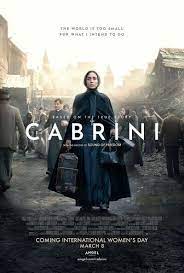
CABRINI
US, 2024, 145 minutes, Colour.
Cristiana Dell'Anna, David Morse, John Lithgow, Giancarlo Giannini, Jeremy Bobb, Romana Maggiora Vergano, Patch Darragh.
Directed by Alejandro Monteverde.
Cabrini – Frances Xavier Cabrini, born in Lombardy in 1850, on mission to New York, 1889, 28 years of enterprising activity, died 1917, beatified 1938, canonised 1946, the first American citizen to be canonised.
Frances Xavier Cabrini established a religious congregation, the Missionary Sisters of the Sacred Heart, whose motto is taken from St Paul: “I can do all things in him who strengthens me.”. 40 minutes into this portrait of Mother Cabrini, we hear her say these words. And, by this stage of the film, we know that this is true. But, there are almost 2 more hours or – an extraordinary extension of “all things”.
The tone is set in the prologue, a young boy, Paolo, close-up on his face, dragging a wheelbarrow, his mother dying of typhus, the New York streets, his calling out for help, in Italian, everybody ignoring him, a policeman accosting him, giving an address where the sick woman could be taken, but she dies. Paolo will later appear in this story.
Then the transition to Italy, a young woman in a religious habit, close-up of her face, the camera dwelling for a long time on her face, inviting us to respond. Throughout the film, the camera will focus on Mother Cabrini’s face, mostly intense, often sad, rarely smiling, but absolutely determined in her goals, and in her confidence on God’s Providence. And she often states that if you begin the mission, the means will come.
Frances Cabrini had a dream of establishing orphanages in China, a compassion for needs in Asia. She has been refused by Vatican officials, eventually visiting Rome, demanding a meeting with Pope Leo XIII, (Giancarlo Giannini) his acceeding to her wish, cup of tea together, his being impressed by her zeal, and the suggestion of a mission in New York. She and her sisters travel, steerage, her looking out on the Atlantic, her fear of water, flashbacks to her almost drowning, being rescued, recovery, but permanent damage to her lungs. Which means that she sees any time not devoted to her mission as, simply, loss.
Mother Cabrini is played by Italian actress, Cristiana Dell’Anna, always intense, an intense interiority, no histrionics. This is a determined woman of faith, the language of faith (though no scenes of prayer and community – and one might have expected some emphasis on her Sacred Heart devotion, though some glimpses of statues and paintings.)
Filmgoers who remember Martin Scorsese’s Gangs of New York, will resonate at the reconstruction of Five Points, built on sewers, squalor, many Italian migrants, not yet speaking English, and despised by so many of the locals, called dagos, guinea pigs, seen as less than human, insulted in the streets, denounced by the local authorities, wooden shacks, but youngsters taking refuge in the underground tunnels and channels, put to menial jobs, often in physical danger. Mother Cabrini goes instantly into action, rescuing children, encountering a young prostitute and clashes with her vicious pimp, continually finding accommodation, looking for buildings, looking for support.
There are many scenes of her confrontations with the Archbishop of New York, Archbishop Corrigan (David Morse), Irish background, reluctant to help Mother Cabrini, urging her to return to Italy, but her continually confronting him. Then there are the local powers, the mayor, John Lithgow portraying him as supremely arrogant, politicians and police under his control, the local police who despise the Italians, ride roughshod over a crowd gathered at an Italian festival in a park.
Mother Cabrini is of strong Italian stock, strong Italian attitudes (and grew up in strong anti-clerical times), ready to confront anyone, Archbishop, Mayor… When she enlists the help of an opera singer, moved by Pagliacci, he refuses because of his antagonism towards the church. When she organises a children’s choir to serenade him at his mansion, he relents, joining in the fundraising. Despite opposition and setbacks, her forte was in persuading people to support her. And her mission forte was the continued outreach, confident in her outreach.
In the 19th century, while women did not have a place in church governance, there were many strong women who ran hospitals, schools, exercising this kind of church leadership. This is to the fore in this screenplay, Mother Cabrini and being a pioneer in feminism, the film’s dialogue uses convincing feminist language to highlight the power of women: the Mayor suggesting she should have been a man, Mother Cabrini replying that men cannot do what women can do.
The screenplay indicates what was to come, orphanages, but, especially after a deadly subway explosion, the need for hospital, the beginning of Cabrini hospitals in many parts of the world. Despite political sanctioned arson, she keeps going. Final close-up of her, intense, determined, her interior confidence in divine Providence, and the information given about what she referred to as her “Empire of Hope”, 67 institutions, her congregation and its outreach throughout the world.
A cinema biography in the long traditional style of such stories, moving, challenging audience compassion.
- Audience knowledge of Frances Cabrini? Italians? Americans? Worldwide? Her being a significant American figure? Her work in New York, the US, worldwide? The first American citizen to be canonised?
- The impact of this characterisation of mother Cabrini, as a person, intense, determined, a sense of mission, ambitions for China, thwarted by the Vatican, the Pope’s suggestion to go to New York, the squalid situations in New York, her pushing forward, conflict with the Archbishop, with the civil authorities, with the Mayor? Her vision, concerned for the poor and children, her entrepreneurial skills, her trust in Providence?
- The opening, Paolo, the wheelbarrow, calling out in Italian, his dying mother, people ignoring him, the gentry? Looking down on Italians, Italian language? The policeman and the destination? Is mother’s death? The intense close-up of his face? His later appearance, with Enzo, in the canals, the support from Mother Cabrini, the situation with Victoria, the pimp, the gun, his father’s suicide gun, Mother Cabrini and the burning of the gun?
- The status of Italians in the US, in New York, the initial information, the numbers, 1890 to 1910, not speaking English, hopes, menial jobs, looked down on as inferiors, day goes, guinea pigs…?
- The focus on Frances Cabrini, the initial focus on her face, intense close-up? The background of her life, the flashbacks to the drowning sequence, the paper boat with leaves symbolic of the mission, her rescue, the damage to her lungs, health prognosis, her not wanting to waste time, wasting time as a loss? With her sisters, the establishing of the group, their work, the orphanage in Lombardy? Her ambitions to go to China for orphanages?
- The letter from the Vatican, her trip, the Cardinals and denial, hostility? A woman? And none? Demanding to see the Pope, his seeing her, cup of tea, chat, the proposal for New York? Her accepting this, the voyage to the US, steerage, the arrival, the priest not there to meet them, walking, the night, the squalor of Five Points, the swamps, the sewers? Seeing the little girls, touching Mother Cabrini? Finding some shelter with the prostitute, barring the door against the pimp? Is banging on the door, his threats?
- The film’s perspective on the character of Mother Cabrini? Italian background, tradition of shrewdness, capacities for success? But the actress and a non-histrionic performance? Often silent, rarely smiling, absolutely determined, long extreme close-ups of her?
- Her intensity and the speed of her work, finding accommodation, poor, cramped, her health and awake at night, pursuing the boys down the sewer hole, the little girls, gathering the children? Finding means to provide shelter, food, clothes? Local support? American hostility?
- The visit to the Archbishop, his Irish background, not pleased to see the nuns in New York, urging them to return? The letter from the Pope? The Archbishop strictures, and their not appealing to Americans for financial support? The later meetings with the Archbishop, her going to Rome, the further letter from the Pope? The Archbishop meet here at the wharf? His support yet his continued strictures? This portrait of an Archbishop, his reference to the people under his care, his selective care, for the wealthy and middle class? Racial issues?
- The encounters with Victoria, the young prostitute, her story of her life, the pimp, and giving the nun shelter, his violence against her, his coming to see the nuns and threatening them? The encounter with Paolo, the shooting? The confrontation of Victoria, her getting a knife, killing him? Victoria and her continued work with mother Cabrini, assisting with the work, finding a new life?
- The role of the police, attacks, the authorities, checking on health situations, evictions? Paying fines?
- Her focus on orphanages and children? The explosion underground, the many killed and wounded, and so and polo finding him, Enzo’s death? Mother Cabrini and her friendship with Dr Murphy, the first encounter, his volunteering, his advice, his advice to her for her health? Discussion about providing a hospital?
- Providence, the belief in beginning the mission and the means will follow? The search for buildings, the Archbishop and the Jesuit land, the lack of water, the digging of wells, Victoria and her eventually getting water? The building for the hospital, the raising of funds? The Archbishop and his forbidding sources for charity? The choice of the building, the poster for Pagliacci, her going to the opera, the interview with the singer, his anti-church attitudes? The children’s choir, serenading him, change of heart, his singing at the Italian Festival? The joy of the festival in the park?
- The role of the police, dispersing of the crowd, the money collected and the authorities saying that that was exactly the amount for the fine?
- Mother Cabrini going to Rome, her approach to the senator, to the Senate, her being rebuffed, rebuked is a woman, going to the senate house, defying the members, her speech, appeal, challenge to the presiding senator? Her return to America, her contacts?
- The local board, decisions, finance, the beginning of the renovation of the building? The hard work, her supervision, the workers? The fire, arson, the destruction?
- Her visit to the Mayor, his arrogant manner, his previous discussions with his officials, anti-Italian, receiving Mother Cabrini, their discussions, the verbal interchanges, his backing down, his saying that she should have been a man – and her reply that men cannot do what women do?
- The further information about her work, hospitals, throughout the US, the map and showing her work beyond America? Her death, living to 67 despite the ill-health prognoses? Beatification 1938, canonisation 1946, patron of immigrants?
Code 8
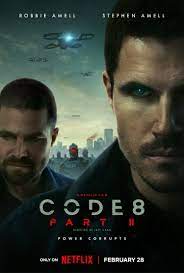
CODE 8
Canada, 2019, 98 minutes, Colour.
Robbie Amell, Stephen Amell, Kari Matchett, Sung Kang, Aaron Abrams, Greg Bryk.
Directed by Jeff Chan.
Code 8 is a Canadian production, futuristic, science fiction elements, and, heists.
The opening, with a dramatic collage, explains the situation of humans with extraordinary powers, being subjugated by the government, replaced by machines, condemned to menial jobs and poverty, surveillance by the police.
The central character is,, played by Robbie Amell, with electric powers, a criminal father, an ailing mother, determined to find money for her medical care, taking on menial jobs, harassed by the police, eventually taking on the job to assist in a robbery managed by Garrett, Robbie Amell’s cousin Stephen Amell, who works for a drug addicted boss who supplies a powerful drug, Psyke, extracted from those with powers and a black market.
There is an ordinary police, who are onto the boss, approaching, Connor, suspicious but letting him go. There are also the drones in the air, robotic police officers dropping to confront criminals, spectacular in its way.
Ultimately, there is a buildup to the robbery of a police van, expertly worked out, but a betrayal of members of the group. Then Connor lets the police know about the headquarters and there is a raid, some violent confrontations and deaths.
The drug lord’s girlfriend has powers of healing so Connor wants her to heal his mother. This is demanding for the young woman, the mother not willing it, and Connor lets his mother go. And he goes to prison.
Five years later there was a sequel, beginning five years later when Connor gets out of prison.
- Futuristic world? Science fiction elements? Heist movie?
- The city, Lincoln City, overviews, high-rise buildings, the streets, homes, hospitals, warehouses, clubs, police precincts? Atmosphere? The musical score?
- The title, the explanations at the beginning, humans with powers, the building of machines, AI, robotics, the persecution of the humans with powers, draining them, the black market on Psyke, menial jobs for those with powers? The role of the police, surveillance, the drones and the military?
- Connor, the background of his father in criminal activity, powers, his mother, illness, supermarket, being fired,, confronting the manager? His powers, electricity, available for day work, schools, the police surveillance and raids, shooting those with powers? Connor concerned about his mother, her deterioration, his wanting money to help her? Agreeing to go with Garrett, the robbery of the drug, the contact with Marcus, meeting Nia, her addiction, her healing powers? The money, being hired by Garrett again, the plan for the robbery,, and his strategies? The other members of the gang?
- The set up for the robbery, road blockage, the truck, Connor and his powers, opening the truck, getting the money, the thugs turning on the members of the gang, shooting them? The escape? Not the expected amount of money? Their going to confront Marcus, the raid, Marcus henchman and the fight, the exercise of powers, his death?
- The police, drug problems, surveillance, suspicions of Marcus, taking in, Connor, and willing to collaborate, let go, the cross purposes of the police? Information about Marcus headquarters, the raid, confrontations?
- Nia, healing Marcus, but taking on the illnesses? Connor wanting her to his mother, to the hospital, his change of heart, letting his mother go?
- Giving Nia the vehicle to escape, visiting his mother’s grave? Going to prison?
- The story continuing in the 2024 Code 8, Part II.
Total Control 3
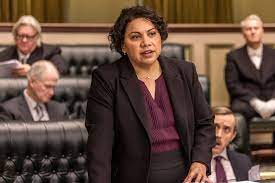
TOTAL CONTROL/ SERIES 3
Australia, 2024, 6 x 60 minutes, Colour.
Deborah Mailman, Rachel Griffiths, Rob Collins, Wayne Blair, Wesley Patten, Huw Higginson, Anthony Hayes, Steph Tisdell, Benedict Hardie, Rosie Lourde, Lisa Hensley, Jozef Beer, Catherine McClements, Fayssal Bazzi, Maya Stange.
Directed by Wayne Blair, Jub Clerc.
The first series of Total Control made such an impact in 2019 that in 2021 the second series went to air on the ABC. Deborah Mailman as Alex Irving, politician, the central character, won many awards. Rachel Griffiths was a strong presence. There were dramatic complications about First Nations people, Alex and her life in Queensland, in Parliament, dependence on Rachel, their clashes. This was developed in the second series, also developing the relationship between Alex and her brother Charlie, Rob Collins, leading to strong tensions. There was also the relationship between Alex and her son, Eddie, Wesley Patten. And there was a great deal of political conflict.
This is taken for granted in the third series, Alex initially seen in Queensland, with her new advisor, very patient and sympathetic Jolie, Steph Tisdell. Alex is campaigning, challenging the government for floods in the North. This sets a pattern for her behaviour throughout this series, as an independent in the House of Representatives, outspoken, always challenging, confronting the new prime minister of a minority government, played by Wayne Blair (who also directed three episodes). She clashes with her brother Charlie, now married, his wife expecting, his working for the prime minister on policy and documents.
And, there is the continuing relationship, friendly and hostile, with Rachel, the latter wanting an alliance of independent members, difficulties in finance, possibilities of corruption, investigative journalist with threats. And there is the continued concern of Alex for her son, his being in Canberra, at a special school, involved in protests against racism, planning to be an exchange student.
There is also the issue of Alex’s health, her incessant work, collapse, surgery, secrecy.
The fifth episode is well worth seeing, parliamentary sitting, Alex warning the prime minister that she would be a threat, proposing amendments, the cause of social justice for the young, trapping the prime minister and his relentless advisor, Sharon, Lisa Hensley, getting the support of the boisterous leader of the opposition, Anthony Hayes, only to outwit him to get support for further amendments which the government is forced to accept.
One of the best of Australian television series.
- The title, Alex, have Total Control of herself?
- The popularity of the series, Australian life, society, First Nations people, politics, corruption, Canberra?
- The value of the miniseries, six hours to develop characters and themes?
- Deborah Mailman as Alex Irving? The three series? The origins, her journey, Queensland, aboriginal, the past, relationship with her mother, crisis and her mother appearing to her, her relationship with Charlie, relationship with her son, Eddie? The opening, the floods in Queensland, the need for aid, government inaction? Her visit, her assistant, representations to the government? Political will? The intervention of the Queensland government, opening the Winton Medical Centre, the irony of her mother and illness, delayed, her death?
- Alex, her age, career, ups and downs, out of the Senate, House of Representatives, relationship with Rachel over the years, relationship with Paul? Paul as Prime Minister, First Nations, minority government, the crossbench, the Greens? Alex and her associations? Her courses, youth justice, the arguments with Paul, the dinner with him and her family, clashes with Charlie? Relationship with the opposition leader, using him, outwitting him? Her reliance on Jolie, price, the bond, the talk, Alex not wanting Jolie to pester her? Her health situation, secretive, the discussions with the doctor, the need for an operation, going to Queensland, the secrecy, collapse, her relationship with Dominic, driver and security, his challenging her – confidant, the later evening, dancing, the kiss? Alex has driven, her moods, strict mother, advised to be free with her son?
- Rachel, the past, her leadership, losing government, the crossbench? Forming the alliance? The think tank? Nick and his influence? Matt, the opposition, her wanting to influence him? Her relationship with Alex, up and down, the visit for to discussions? Lobbying for boats? Rachel and the encounters with Marian, the interview, the material for the article, Rachel wanting the injunction, collaboration with the Greens, the think tank, the finances? Kathleen, the discussion, Helena, wanting to support? Her being the source of Marian’s information? Kathleen hacking Marian? Rachel and the confrontation? Rachel and her voting record? Peter and his advisory role, constant? Alex and her anger with Rachel, Rachel saying she was not above suspicion? Alex justifying herself and abandoning Rachel?
- Paul, Prime Minister, aboriginal background, political savvy, the minority government, personal involvement, strengths and weaknesses? The parliamentary sittings and abuse?) Sharon, tough attitudes, advice, strategies? The relationship with Alex, the conflicts? Alex challenging? Charlie, his job, writing, the deadlines, policies? Charlie and his outburst against Paul, the aftermath? Alex and her visits, the threats, the setting of the house of parliament, her amendments, Paul being trapped?
- The picture of the opposition, the gung ho leader, his abuse of parliamentarians, the Speaker correcting him? Conservative, his following? Supporting Alex, a new amendments, his being trapped, his eyes harsh attitudes towards youth? The walkout of his members who did not support him? Matt, principals, urged by Rachel, the rebel group, part of the alliance?
- Eddie, his age, Queensland background, life and friends, at home there? In Canberra, the school, private school, the students? Skipping school, friends, elitist groups? His protesting, the bigoted security guard, filming him, his being arrested, Alex ambushed by the media? Her reaction? Taking him to Queensland? Her not telling him about her health? The friend whom he supported with the filming, the police, going to the party, Charley driving them home, drinking, drunk, sick? Supported by Dee? Her pregnancy, waters breaking, driving her to the hospital, his presence, support, calling the baby Eric? His wanting to be an exchange student, the decision coming through, Iceland? His demanding honesty from his mother?
- Charlie, relationship with Alex, family, in Canberra, the previous attack on Alex and himself, the stabbing, the racist attack, the court case, the racists interview and apology? Charlie and his relationship with Dee, her pregnancy, nice couple, her professionalism, his job, the deadlines, the timing, policies? Phone calls with Alex? His outburst against Paul? His decision to go to therapy, the meetings? Late for the birth? Decisions about the future, haven’t Dee and her job, going back to Winton, the possibilities of New York?
- Jolie, the big woman, motherly, advisor and confidante to Alex, Rachel offering her the job, concerned about Alex’s health? Thank advice? The final decision about parliament?
- The Parliamentary sequence, the Speaker getting ready, the formalities, the rowdiness and the Speaker intervening? The issue, the amendments, the reactions, Alex and her presentation, having the floor, Paul and Sharon, the opposition initially supporting, Alex outwitting them, her speeches, the divisions, the press response? The success? The press and the accusations of corruption? Her collapse?
- The issue of corruption, Marion in her article, the accusations against Helena, her resigning? Rachel offering supply? Marian leaving the confidential dossier for Alex? The press conference and her honesty, the final confrontation with Rachel? The alliance, and Matt announcing Alex as leader?
- The finale, Alex talking to camera, about aboriginal leadership, accusations and challenges to the audience?
You'll Never Find Me
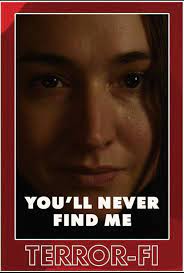
YOU'LL NEVER FIND ME
Australia, 2023, 96 minutes, Colour.
Brendan Brock, Jordan Cowan.
Directed by Josiah Allen, Indiana Bell.
For audiences who enjoy a thriller with atmosphere of suspense, mystery, suggested violence with some violent overtones, You’ll Never Find Me is worth finding.
Filmed in Adelaide, trailer set, two characters confined to the trailer, some glimpses outside, the trailer park and some children running away, a violent storm, the action opening at 2 AM.
Patrick (Brendan Brock) is an ageing loner, former electrician (and proud of it), suddenly disturbed by pounding on his caravan door, letting in drenched young woman who is never named (Jordan Cowan). She has a strange story, wanting a phone (which he doesn’t have), coming from the beach, some incoherent details in her story. Cautious, he offers her some hospitality.
For the rest of the film, there are certainly cat and mouse episodes, wet clothes, his supplying some, a shower, some soup, playing cards, some storytelling, Patrick with a long story about his wife, meeting her, her death. At times the young woman is calm, at other times searching the trailer, wary.
We know that there are going to be some twists by the end. And there are.
The film is effectively atmospheric, claustrophobic, tentative in relationships, frightening aspects, building up to a climax, ambiguous or not.
- The title, reference to Patrick, to The Visitor?
- A two hander, the glimpse of other characters, the action confined to the trailer, the outside view, the trailer park, the stormy night, the car and the rain? The interiors? The musical score?
- The situation, Patrick, his age, electrician in the past, the electric socket and the screwdriver, his comment about putting the screwdriver in more apt places? Retirement? The trailer, the interiors, his started life? 2 AM, the vast storm, the pounding at the door, his listening to the song?
- The visitor, young, her age, wet, Patrick’s warIness in letting her in, asking for a phone, to get a car, to get away? Different aspects of her story, on the beach, home or hotel, drinking, lost, Patrick not having a phone (and the later revelation)?
- Patrick, tentative, inviting the visitor in, the discussions, her warIness, wet, removing the shirt to dry, the shower, the blood in the shower and her imagination, the drink and his making tea, the hot soup, the alcohol? Patrick putting her more at ease?
- His story, meeting the young woman, drinking, helping her, the marriage? Her death by overdose? The early scene of his having the poison, audiences assuming it was for him, the revelation of the dead body, the story, and his poisoning the visitor?
- Playing cards, at ease? The visitor and her looking at his trailer, finding her matching hearing? His denial?
- The shift in attitudes, his aggression, the poison, the visitor searching, finding the dead body? Her aggression towards him, collapse, the dead body wrapped?
- The issue of reality, Patrick’s imagination, serial killer, the image of the victims killed, the number? What was going on in his head?
- And the final knock on the door, his story of the kids knocking and disappearing, glimpse of the boys running away?
- The two hander, the horror elements, the violence, reality and imagination?